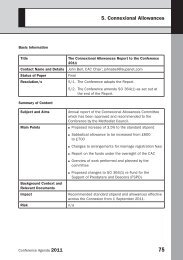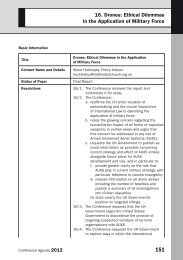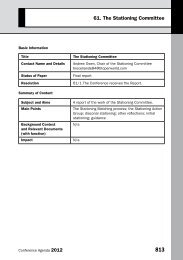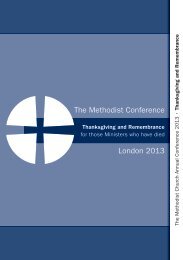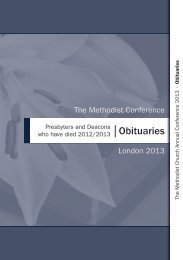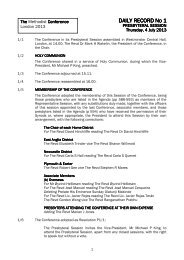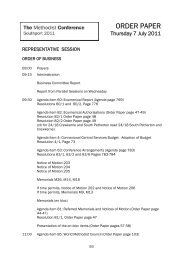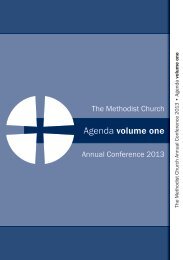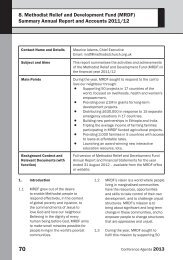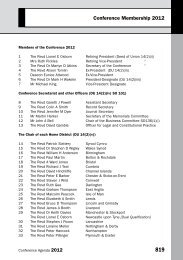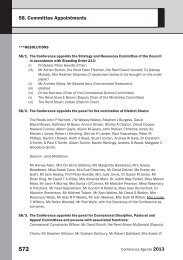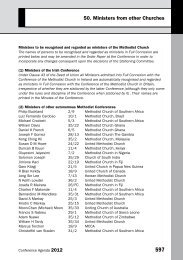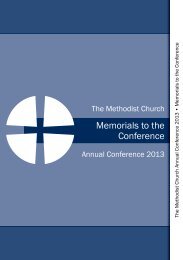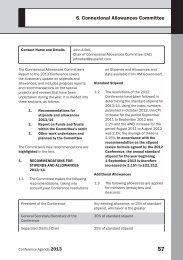Agenda Volume 3 - Methodist Conference
Agenda Volume 3 - Methodist Conference
Agenda Volume 3 - Methodist Conference
Create successful ePaper yourself
Turn your PDF publications into a flip-book with our unique Google optimized e-Paper software.
57. The Fruitful Field Project<br />
which would be required to renovate<br />
the premises at Wesley House, or<br />
the dislocation, developmental work<br />
and associated capital expenditure<br />
which would be required to establish<br />
new premises in Cambridge; (b) the<br />
weakness of existing links between<br />
Wesley House and the University<br />
of Cambridge, as demonstrated by<br />
the low number of Wesley House<br />
students studying for University of<br />
Cambridge awards and by the lack of<br />
developed projects or partnerships<br />
with the university at the level of<br />
scholarship and research activity.<br />
236 An assessment of configurations<br />
involving the Wesley Study Centre,<br />
Durham noted, among other<br />
strengths, the contribution which<br />
would be made by a continuing<br />
association with Durham University,<br />
its theology faculty and St John’s<br />
College, all of which have taken a<br />
proactive interest in establishing<br />
robust and long-lasting links with<br />
the Wesley Study Centre and the<br />
<strong>Methodist</strong> Church. However, an<br />
assessment of configurations<br />
involving the Wesley Study Centre<br />
also noted, among other weaknesses:<br />
(a) the developmental work and the<br />
very significant capital expenditure<br />
which would be likely to be required<br />
to establish a centre within a<br />
context where the Wesley Study<br />
Centre currently occupies limited<br />
space within St John’s College; (b)<br />
the difficulties which some across<br />
the south of the Connexion would<br />
experience in travelling to Durham,<br />
especially given the location of Cliff<br />
College in Calver, Derbyshire; (c)<br />
the loss to the <strong>Methodist</strong> Church<br />
of the use of the premises and<br />
assets currently available at both<br />
Birmingham and Cambridge in favour<br />
of establishing new premises in<br />
Durham, and the associated risk of<br />
not being able to redirect assets from<br />
the other two locations to Durham.<br />
237 An assessment of configurations<br />
involving three centres noted the<br />
improved accessibility in terms of<br />
transport links which naturally flows<br />
from having a third centre. However,<br />
such an assessment also noted<br />
two overriding weaknesses: (a) the<br />
very significant capital expenditure<br />
which would be required to renovate<br />
the premises, or the dislocation,<br />
developmental work and associated<br />
capital expenditure which would be<br />
required to establish new premises at<br />
two of the centres; (b) the increased<br />
risk of replication, fragmented<br />
provision, missed opportunities for<br />
cross-fertilisation across and between<br />
activities, and an inefficient use of<br />
resources, as discussed at greater<br />
length in paragraphs 201-204 above.<br />
238 The Committee was grateful to a<br />
tutor whose submission, made during<br />
the consultation period, noted that<br />
“the Ministries Committee has not<br />
shirked its responsibility to be radical<br />
and to challenge all of us working in<br />
the sector, and I welcome that after<br />
the frustrations of working within the<br />
framework of the previous review of<br />
training institutions.” However, when<br />
it came to make a final decision<br />
<strong>Conference</strong> <strong>Agenda</strong> 2012 741



